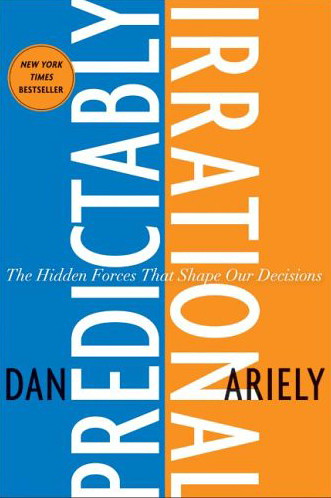
Dan Ariely - "Predictably Irrational: The Hidden Forces That Shape Our Decisions"
304 pages | HarperCollins 2008 | ISBN: 006135323X | PDF | 4 Mb
304 pages | HarperCollins 2008 | ISBN: 006135323X | PDF | 4 Mb
Irrational behavior is a part of human nature, but as MIT professor Ariely has discovered in 20 years of researching behavioral economics, people tend to behave irrationally in a predictable fashion. Drawing on psychology and economics, behavioral economics can show us why cautious people make poor decisions about sex when aroused, why patients get greater relief from a more expensive drug over its cheaper counterpart and why honest people may steal office supplies or communal food, but not money. According to Ariely, our understanding of economics, now based on the assumption of a rational subject, should, in fact, be based on our systematic, unsurprising irrationality. Ariely argues that greater understanding of previously ignored or misunderstood forces (emotions, relativity and social norms) that influence our economic behavior brings a variety of opportunities for reexamining individual motivation and consumer choice, as well as economic and educational policy. Ariely's intelligent, exuberant style and thought-provoking arguments make for a fascinating, eye-opening read.
Contents
INTRODUCTION. How an Injury Led Me to Irrationality and to the Research Described Here
CHAPTER 1. The Truth about Relativity: Why Everything Is Relative--Even When It Shouldn't Be
CHAPTER 2. The Fallacy of Supply and Demand: Why the Price of Pearls--and Everything Else--Is Up in the Air
CHAPTER 3. The Cost of Zero Cost: Why We Often Pay Too Much When We Pay Nothing
CHAPTER 4. The Cost of Social Norms: Why We Are Happy to Do Things, but Not When We Are Paid to Do Them
CHAPTER 5. The Influence of Arousal: Why Hot Is Much Hotter Than We Realize
CHAPTER 6. The Problem of Procrastination and Self-Control: Why We Can't Make Ourselves Do What We Want to Do
CHAPTER 7. The High Price of Ownership: Why We Overvalue What We Have
CHAPTER 8. Keeping Doors Open: Why Options Distract Us from Our Main Objective
CHAPTER 9. The Effect of Expectations: Why the Mind Gets What It Expects
CHAPTER 1O. The Power of Price: Why a 50-Cent Aspirin Can Do What a Penny Aspirin Can't
CHAPTER 11. The Context of Our Character, Part I: Why We Are Dishonest, and What We Can Do about It
CHAPTER 12. The Context of Our Character, Part II: Why Dealing with Cash Makes Us More Honest
CHAPTER 13. Beer and Free Lunches: What Is Behavioral Economics, and Where Are the Free Lunches?
Thanks
List of Collaborators
Notes
Bibliography and Additional Readings
Index
Index of Ideas